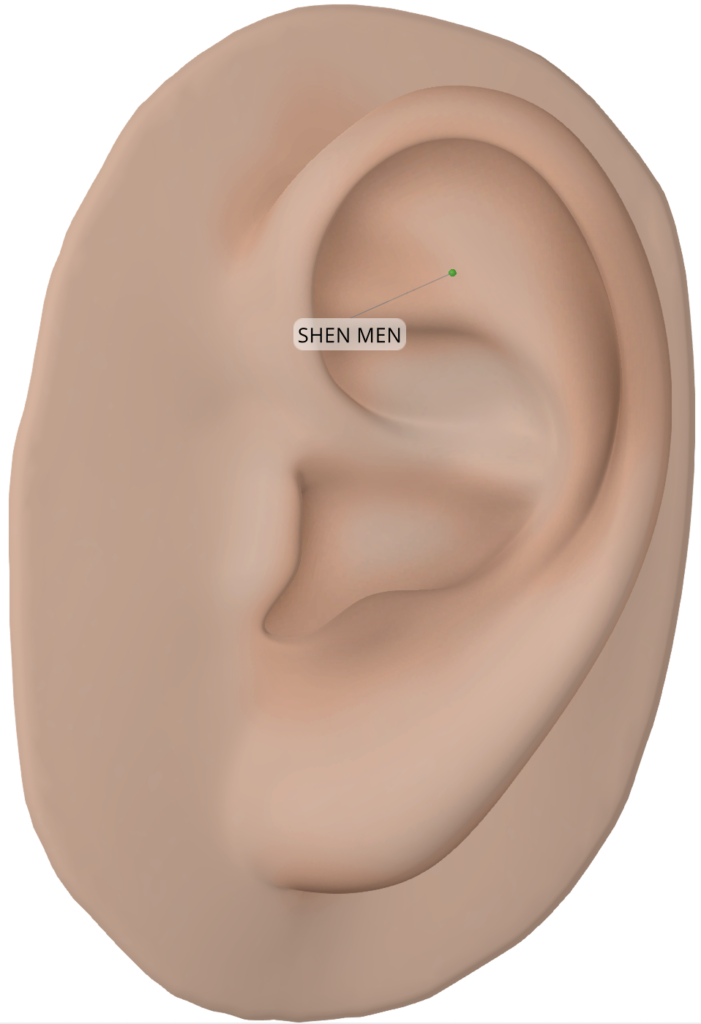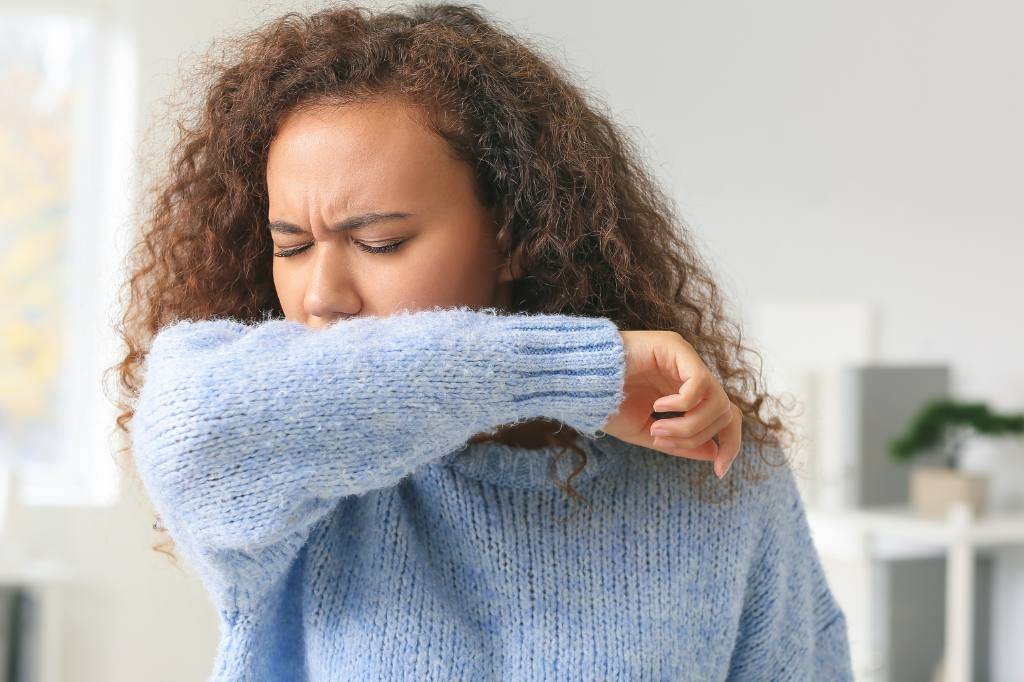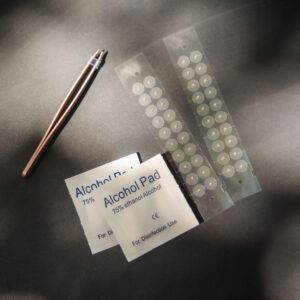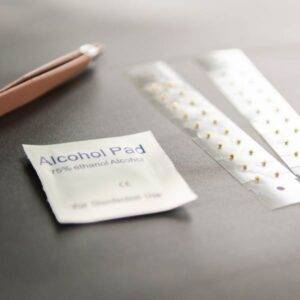Piercing various points on the ear to help with health conditions has become an increasingly popular practice. But is it safe and effective? Is there research to support it? And is there a better alternative?
What’s behind the phenomenon of piercing ears for health reasons?
The idea of piercing ears to help with health conditions, from anxiety to migraines, is rooted in the theory of auriculotherapy (meaning “therapy of the ear”).
This theory is the foundation of ear acupuncture and acupressure. It draws on the principle of the ears as gateways to the body’s complex, interconnected systems.
The ear represents a map of the body. Stimulating certain points on the ear (through acupressure seeds or beads for acupressure, or through needles for acupuncture), therefore, unlocks healing mechanisms across the body.
Ear piercing for health benefits is controversial in the world of auriculotherapy. One eMedicineHealth article says, “Practitioners of ear acupuncture (auriculotherapy), a form of alternative medicine, say that ear piercings have therapeutic benefits…”
But auriculotherapy specialist Tamara Gentry is not a believer in piercings like the Shen Men piercing to for health and wellness benefits.
“Piercings cause scar tissue to form and nerve endings to die, impeding the continuous flow of energy that could otherwise initiate a healing process,” she says.
What are some common ear piercings for therapeutic benefits?
The Shen Men, Daith, and Rook are perhaps the most common types of piercings for their potential therapeutic benefits.
Shen Men Piercing
Shen Men, also known as the “Spirit Gate” or “Divine Gate,” is a well-known auricular acupoint. It is located in the upper part of the ear’s triangular fossa, near the helix. Some enthusiasts believe that piercing the Shen Men point may help with relaxation, stress relief, and overall well-being.
Daith Piercing
The Daith piercing is positioned in the innermost cartilage fold of the ear, close to the ear canal. Some individuals opt for Daith piercings in the hope that it may alleviate migraine headaches. However, the evidence supporting its effectiveness for this purpose is limited and anecdotal.
Rook Piercing
The Rook piercing is typically done in the antihelix of the ear, above the tragus and slightly inward. This piercing is mostly chosen for how it looks, but some people believe it may help with anxiety.
Why some people get a Shen Men piercing
1. They believe it will help them.
Whether seeing it trend on TikTok as a potential solution to anxiety or reading about its possible benefits on a blog, people who get the Shen Men piercing for purported health reasons do believe they’ll reap the rewards.
And sometimes the healing power of belief, even as a placebo effect, is strong enough to induce positive outcomes regardless of whether evidence exists to support that something like a Shen Men piercing actually works.
2. It’s inexpensive.
Although a single cartilage piercing can range anywhere from $40 to $100, it’s a small price to pay for a “one and done” treatment, advocates of the Shen Men piercing say.
Of course, it’s not a therapy that would be covered by insurance, but most alternative and complementary therapies aren’t anyway.
So people who have exhausted all other efforts for ailments like migraines or anxiety won’t think twice for paying a relatively low price for something they think could make them feel better.
3. It’s easily accessible.
Practically any adult can get a Shen Men piercing on any given day (or evening), in any given city, and in many cases, as a walk-in. That’s how accessible getting a piercing is.
Contrast this experience with visiting a healthcare professional, where you usually have to make an appointment beforehand, you wait in a waiting room, you show an insurance card (assuming you have insurance), then you visit a pharmacy for any prescriptions written as a result of the appointment.
If there’s a chance that a Shen Men piercing can provide a health benefit, it’s easy to understand the appeal of and preference for opting for that “treatment.”
Shen Men piercing problems and issues
1. There are risks and potential side effects.
Piercings in general come with some risks. Typically, the risk of side effects from your everyday, standard earlobe piercing is low for most people. But due to the more sensitive and cartilage-heavy location on the ear, a Shen Men piercing carries a greater risk — of both infection and pain.
In addition, healing time is slow (sometimes up to a year!), and the process must be approached with plenty of TLC.
The network of nerve pathways that converge in the ears communicates with every part of the body. Piercings through any part of the ear impact the nerve conduction of that particular ear point or area.
2. There’s little evidence to support treatment by Shen Men piercing.
Another risk is the chance that it just won’t work to treat or support the health condition (often anxiety) that you’re targeting.
A now-archived 2022 Reddit thread with 111 upvotes and 137 comments shows person after person saying that although the Shen Men piercing may look cool and, for some, boosts confidence, it hasn’t successfully relieved anxiety for them:
Any experience with the shen men piercing and if it works for anxiety? I’m thinking about getting one!
byu/Eli_2001 inpiercing
Like the Daith piercing, a lack of evidence-based research exists to support Shen Men piercing. In fact, the exact-match phrase “Shen Men piercing” returned zero search results when typed into Google Scholar. Naturally, this raises some questions about the efficacy of this practice.
An alternative to the Shen Men piercing: ear seeds
If you’re thinking about getting your Shen Men pierced for potential therapeutic reasons, we’d recommending starting out with ear seeds first. Ear seeds are tiny acupressure beads that stick to your ear with a piece of small adhesive tape.

Stick those ear seeds right on the Shen Men point as an alternative to getting your Shen Men pierced. Follow the 4-3-1 protocol for ear seeding, and see if it can provide you much-needed relief (ear seeds are evidence-based, backed by peer-reviewed research) without the risks and side effects of a piercing.
You can always take the ear seeds on and off, but a piercing requires that next level of commitment. As always, be sure to do your research, consult your healthcare provider as needed, and make sure you feel at peace with any decision you are considering.
Happy seeding (or piercing, if that’s the route you take)!
References:
Bhandari, P., Eukesh, R., Sapra, A., Davis, D., & Brenham, C. (2020). Daith Piercing: Wonder Treatment or Untested Fad? Cureus, 12(2). https://doi.org/10.7759/cureus.6978




